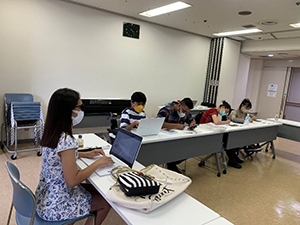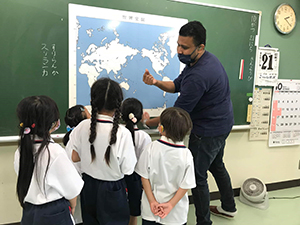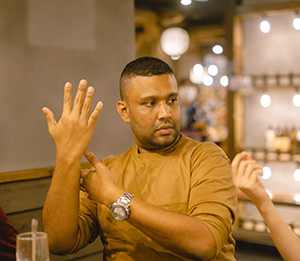Final Report
Kavinda's Final Report
A deaf community in which everything is possible
Introduction: The reason I applied for the training in Japan
My name is Bastian Koralalage Delshan Kavinda Rodrigo. I am deaf from birth, but I got to know about the deaf community during my higher education. I noticed many differences between how people communicate in the deaf community, and how other people communicate.
In a developing country like Sri Lanka, the rights of the deaf community are not advanced. Thus, the deaf community in Sri Lanka faces many barriers in terms of communication, employment rights, higher education and living conditions. Therefore, as I am also a deaf person, I have been contributing to the development of the deaf community. In 2013, I started supporting the Gampaha District Deaf Association as an active member. In 2014, the members of the association decided to appoint me the secretary of the Gampaha District Deaf Association because I had knowledge of the Sri Lankan language, Sinhala. Ever since, I have held in the position.
From 2015, I applied to the Japan Duskin Leadership Trainee Program four times to gain more knowledge and experience in Japan for the development of the deaf community in Sri Lanka, and luckily in 2019, I was chosen as one of the 22nd Duskin Leadership Program trainees.
Taking this opportunity, I wanted to gain experience and to knowledge on four issues: employment of the deaf, deaf education, functioning of deaf organizations, and human rights for the deaf.
Long wait till starting training in Japan
Although I was chosen for the 22nd Duskin Leadership Training in 2020, the training was delayed by the COVID pandemic for a year. From 2021, basic Japanese and Japanese sign language lessons were provided via Zoom. They were useful for me for communicating in Japan.
On April 23, 2022, I finally arrived in Japan under strict COVID restrictions and rules. After arriving in Japan and completing the quarantine period, I participated in Japanese language and Japanese sign language training and group training, face to face with other trainees and instructors. In the group training, I gained knowledge and experience on subjects such as unity, positive thinking, and how to face challenges as a disabled person.

The experience and knowledge I gained through the training program
I was able to assist the care for elderly deaf people in a facility I visited during my training. Elderly deaf people in Sri Lanka have no choice but to stay at home.
We are definitely in need of such facilities in Sri Lanka.
Similarly, I was keenly aware of the need for facilities for people with multiple disabilities, both intellectual and hearing, to provide daily living assistance and care.
I also learned about places to provide information to the deaf and how to train sign language interpreters.
I learned that a number of deaf people in Japan are self-employed.
I could share the self-employment methods I saw in Japan with deaf people in Sri Lanka.
There are universities in Japan for the deaf and hard of hearing where I was able to see appropriate and adequate ways for providing information to students.
I met children at a Japanese school for the deaf and in the after-school day service to support their learning and saw teaching methods and teaching plans full of visual information, which I had not seen in Sri Lanka.
I learned and realized many things in Japan, and I would like to start and manage some of them as projects in Sri Lanka.

What I felt about Japan’s environment
When I came to Japan, I saw how there are so many facilities for people with disabilities. And Japanese people were all kind and friendly.
I found Japanese people, by their national character, meticulous and precise. Strict time management is being taught.
This was most likely the reason the students were so well-behaved.
The clean roads and public transport also show people’s focus on the importance of the beauty of the environment and thorough ensuring of the rules.
My future goals and vision after returning to Sri Lanka
I am convinced that employment opportunities for deaf people should not be limited to working in companies but include other choices such as self-employment.
Education of deaf children in deaf schools needs to be changed in order to fill the gap between deaf and hearing people, and I would like to support this movement.
The deaf community itself needs to be revitalized and awareness raised, including through deaf fights movements.
As a member of Gampaha Deaf Association in Sri Lanka. I would like to work on what I learned during my training in Japan.
The most interesting experience I had in Japan is the tea cafe which had been started in Hyogo by a self-taught deaf person with the aim of providing sign language knowledge to the society.
When I return to Sri Lanka, I plan to start a tea cafe called "You with Deaf Us". I hope this plan will help improve employment opportunities for the hearing-impaired in Sri Lanka.
Based on how the plan works out, I would like to start a care center for deaf adults in 10 years.
Final words
After applying to the Duskin program four times, I was fortunate enough to be selected as one of the 22nd Duskin trainees, representing Sri Lanka, before reaching my age limit. I believe that the success I have seen in Japan through my efforts can be achieved in the future as I work for the welfare of the deaf community. I learned from people’s lives in Japan that dedication and effort conquer all.
Expressing thanks
I would like to thank the Duskin Ainowa Foundation for having granted me the most valuable opportunity of my life to come to Japan, to the teachers and deaf activist leaders who guided me in Japan, to Ms. Nasu and all the staff of the Japanese Society for Rehabilitation of Persons with Disabilities, and to all the staff of Toyama Sunrise. May you all be blessed to be the strength of the next Duskin generation.





